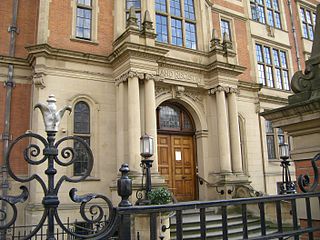
Thomas Henry Bingham, Baron Bingham of Cornhill,, was an eminent British judge who was successively Master of the Rolls, Lord Chief Justice and Senior Law Lord. He was described as the greatest lawyer of his generation. Baroness Hale of Richmond observed that his pioneering role in the formation of the United Kingdom Supreme Court may be his most important and long-lasting legacy. Lord Phillips of Worth Matravers regarded Bingham as "one of the two great legal figures of my lifetime in the law". Lord Hope remembered Bingham as "the greatest jurist of our time".

Unconscionability is a doctrine in contract law that describes terms that are so extremely unjust, or overwhelmingly one-sided in favor of the party who has the superior bargaining power, that they are contrary to good conscience. Typically, an unconscionable contract is held to be unenforceable because no reasonable or informed person would otherwise agree to it. The perpetrator of the conduct is not allowed to benefit, because the consideration offered is lacking, or is so obviously inadequate, that to enforce the contract would be unfair to the party seeking to escape the contract.

English contract law is the body of law that regulates legally binding agreements in England and Wales. With its roots in the lex mercatoria and the activism of the judiciary during the industrial revolution, it shares a heritage with countries across the Commonwealth, from membership in the European Union, continuing membership in Unidroit, and to a lesser extent the United States. Any agreement that is enforceable in court is a contract. A contract is a voluntary obligation, contrasting to the duty to not violate others rights in tort or unjust enrichment. English law places a high value on ensuring people have truly consented to the deals that bind them in court, so long as they comply with statutory and human rights.

Lloyds Bank plc v Rosset[1990] UKHL 14 is an English land law, trusts law and matrimonial law case. It specifically deals with the translation into money of physical contributions from a cohabitee or spouse, under which its principles have been largely superseded.

United Kingdom administrative law is part of UK constitutional law that is designed through judicial review to hold executive power and public bodies accountable under the law. A person can apply to the High Court to challenge a public body's decision if they have a "sufficient interest", within three months of the grounds of the cause of action becoming known. By contrast, claims against public bodies in tort or contract are usually limited by the Limitation Act 1980 to a period of 6 years. Almost any public body, or private bodies exercising public functions, can be the target of judicial review, including a government department, a local council, any Minister, the Prime Minister, or any other body that is created by law. The only public body whose decisions cannot be reviewed is Parliament, when it passes an Act. Otherwise, a claimant can argue that a public body's decision was unlawful in five main types of case: (1) it exceeded the lawful power of the body, used its power for an improper purpose, or acted unreasonably, (2) it violated a legitimate expectation, (3) failed to exercise relevant and independent judgement, (4) exhibited bias or a conflict of interest, or failed to give a fair hearing, and (5) violated a human right. As a remedy, a claimant can ask for the public body's decisions to be declared void and quashed, or it could ask for an order to make the body do something, or prevent the body from acting unlawfully. A court may also declare the parties' rights and duties, give an injunction, or compensation could also be payable in tort or contract.

Smith v Eric S Bush [1990] UKHL 1 is an English tort law and contract law case, heard by the House of Lords. First, it concerned the existence of a duty of care in tort for negligent misstatements, not made directly to someone relying on the statement. Second, it concerned the reasonableness of a term excluding liability under the Unfair Contract Terms Act 1977, s 2(2) and s 11.

Henderson v Merrett Syndicates Ltd [1994] UKHL 5 was a landmark House of Lords case. It established the possibility of concurrent liability in both tort and contract.

Lloyds Bank Ltd. v. Bundy[1974] EWCA 8 is a landmark case in English contract law, on undue influence. It is remarkable for the judgment of Lord Denning MR who advanced that English law should adopt the approach developing in some American jurisdictions that all impairments of autonomy could be collected under a single principle of "inequality of bargaining power."
Unconscionability in English law is a field of contract law and the law of trusts, which precludes the enforcement of voluntary obligations unfairly exploiting the unequal power of the consenting parties. "Inequality of bargaining power" is another term used to express essentially the same idea for the same area of law, which can in turn be further broken down into cases on duress, undue influence and exploitation of weakness. In these cases, where someone's consent to a bargain was only procured through duress, out of undue influence or under severe external pressure that another person exploited, courts have felt it was unconscionable to enforce agreements. Any transfers of goods or money may be claimed back in restitution on the basis of unjust enrichment subject to certain defences.

Street v Mountford[1985] UKHL 4 is an English land law case from the House of Lords. It set out principles to determine whether someone who occupied a property had a tenancy, or only a licence. This mattered for the purpose of statutory tenant rights to a reasonable rent, and had a wider significance as a lease had "proprietary" status and would bind third parties.

Royal Bank of Scotland plc v Etridge [2001] UKHL 44 is a leading case relevant for English land law and English contract law on the circumstances under which actual and presumed undue influence can be argued to vitiate consent to a contract.
Bank of Credit and Commerce International S.A. v. Aboody [1992] 4 All ER 955 is an English contract law case relating to undue influence.

Barclays Bank plc v O’Brien[1993] UKHL 6 is an English contract law case relating to undue influence. It set out the basic categories of undue influence as,

English land law is the law of real property in England and Wales. Because of its heavy historical and social significance, land is usually seen as the most important part of English property law. Ownership of land has its roots in the feudal system established by William the Conqueror after 1066, and with a gradually diminishing aristocratic presence, now sees a large number of owners playing in an active market for real estate. The modern law's sources derive from the old courts of common law and equity, along with legislation such as the Law of Property Act 1925, the Settled Land Act 1925, the Land Charges Act 1972, the Trusts of Land and Appointment of Trustees Act 1996 and the Land Registration Act 2002. At its core, English land law involves the acquisition, content and priority of rights and obligations among people with interests in land. Having a property right in land, as opposed to a contractual or some other personal right, matters because it creates privileges over other people's claims, particularly if the land is sold on, the possessor goes insolvent, or when claiming various remedies, like specific performance, in court.

Registered land in English law accounts for around 88 per cent of the total land mass. Since 1925, English land law has required that proprietary interests in land be registered, except in cases where it is necessary to protect social or family interests that cannot reasonably be expected to be registered. English law also runs a parallel system for around 12 per cent of land that remains unregistered.

Thompson v Foy[2009] EWHC 1076 (Ch) is an English land law case concerning the right of a person with an overriding interest in a home and deals with a family arrangement for a house to be a gift transferring from a mother to a daughter and the trust between the two parties that the daughter would pay the mother her sum to buy out her share of the property.
Undue influence in English law is a field of contract law and property law whereby a transaction may be set aside if it was procured by the influence exerted by one person on another, such that the transaction cannot "fairly be treated the expression of [that person's] free will".

CIBC Mortgages plc v Pitt[1993] UKHL 7 is a decision of the House of Lords relating to undue influence. The decision confirmed that a person did not need to suffer "manifest disadvantage" under a transaction in order to challenge it for actual undue influence.

Bank of Montreal v Stuart is a decision of the Judicial Committee of the Privy Council on appeal from the Supreme Court of Canada. It deals with the principle of undue influence in relation to contracts, in the particular context of dealings between spouses. Decided in 1910, the case continues to be cited in the courts in Canada and in England and Wales.
Times Travel (UK) Ltd v Pakistan International Airlines Corp [2021] UKSC 40 is an English contract law case, concerning economic duress.















